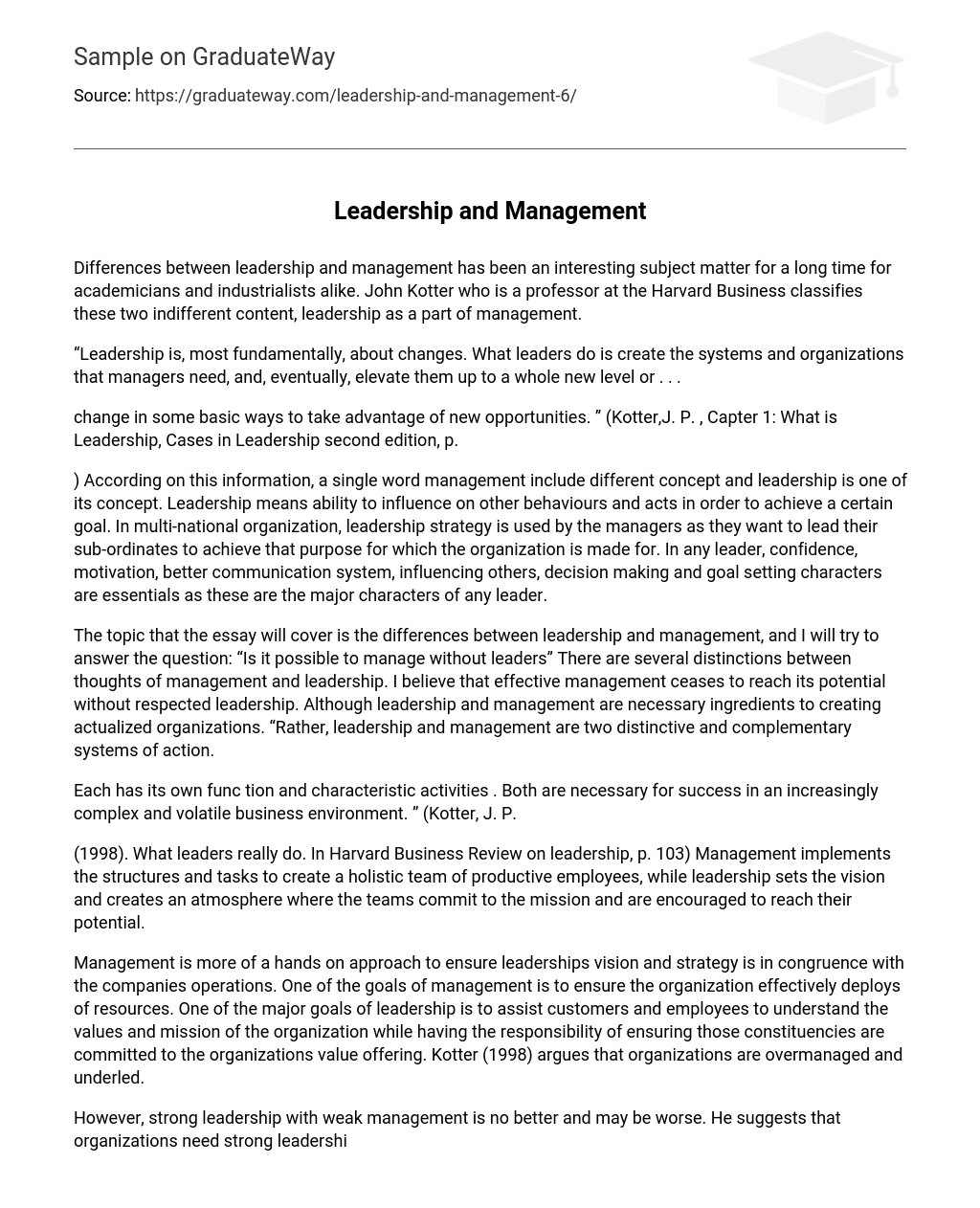Both scholars and business professionals have found leadership and management to be fascinating subjects. According to John Kotter, a professor at Harvard Business School, although leadership and management are distinct concepts, they are also interconnected, with leadership being a subset of management.
Leadership’s main focus is on driving change. Leaders have the responsibility of creating systems and organizations that managers need, ultimately empowering them to achieve a higher level or…
Change in some fundamental ways to exploit new opportunities. ” (Kotter,J. P. , Capter 1: What is Leadership, Cases in Leadership second edition, p.
Management involves various concepts, including leadership. Leadership is the ability to influence the behaviors and actions of others in order to achieve a specific goal. In multinational organizations, managers use leadership strategies to guide their subordinates in achieving the organization’s objectives. Confidence, motivation, effective communication, influencing skills, decision-making abilities, and goal-setting are essential qualities for any leader.
The essay will compare leadership and management and explore whether it is possible to have management without leaders. There are distinct differences in how management and leadership are perceived. In my view, respected leadership is essential for effective management to reach its full potential. However, both leadership and management are vital for the success of organizations. Instead, they are separate but interconnected systems of action.
Both innovation and operation have their own specific functions and distinctive activities. They are both crucial for achieving success in today’s intricate and unstable business landscape.” (Kotter, J. P.)
(1998). What leaders truly accomplish. In Harvard Business Review on leadership, p. 103) Management puts into action the frameworks and duties to establish a comprehensive team of efficient employees, while leadership establishes the vision and fosters an environment in which the teams fully dedicate themselves to the mission and are motivated to achieve their maximum capabilities.
Management is primarily focused on aligning leadership’s vision and strategy with company operations, aiming to efficiently utilize resources within the organization. Conversely, leadership’s main objective is to assist customers and employees in understanding the organization’s values and mission, while also ensuring their commitment to the organization’s value proposition. Kotter (1998) contends that organizations often suffer from excessive management and a lack of effective leadership.
According to the author, having strong leadership without strong management is not advantageous and may even be detrimental. The author asserts that organizations require both strong leadership and strong management. Managers play a crucial role in managing complexity by implementing planning and budgeting, organizing and staffing, and controlling and problem solving. On the other hand, leaders are essential in managing change by defining a direction, aligning individuals, and motivating and inspiring them.
According to the author, organizations require individuals who can effectively perform both leadership and management roles. The author believes that the role of leadership entails working with employees, customers, and suppliers to determine necessary changes, while management is responsible for successfully implementing these initiatives. Nevertheless, management plays a crucial role in the organization and oversees leadership’s responsibilities. Senge argues that significant change initiatives invariably result in individuals experiencing a heightened sense of purpose and ambition. It is the responsibility of leadership to ensure that opportunities for such meaning and aspiration are present within the organization, and exceptional leaders consistently strive to inspire these qualities.
Management and leadership play distinct roles in an organization. Management ensures that the desired results are achieved by challenging the company’s vision created by leadership. On the other hand, leadership creates an atmosphere for meaning and aspiration to thrive by identifying opportunities for a greater vision. As Nonaka (quoted from Dance of Change) explains, a company is not a machine but a living organism. Similar to an individual, it can have a collective sense of identity and shared purpose, with a shared understanding of what the company stands for.
Leadership must create opportunities for the shared vision and collective sense of identity to emerge. Leadership can inspire this to happen through initiatives in cross-department relationship building and teamwork building. Management has the responsibility to ensure this occurs, while leadership sets the strategy and places high goals on the corporate agenda. Leadership determines the priorities, while management executes them.





